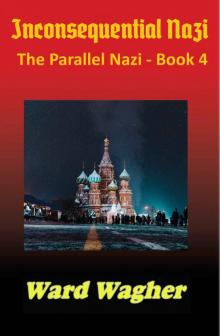- Home
- Ward Wagher
Impossible Nazi
Impossible Nazi Read online
Impossible Nazi
Parallel Nazi – Book 3
Ward Wagher
This is a work of fiction. All the characters and events portrayed in this book are fictional, and any resemblance to real people or incidents is purely coincidental.
Copyright © 2018 Ward Wagher
All rights reserved.
ISBN: 9781717839855
Cover photo by Ricardo Gomez Angel
Impossible Nazi
Parallel Nazi – Book 3
Ward Wagher
Books by Ward Wagher
The Parallel Nazi Series
Accidental Nazi
Improbable Nazi
Impossible Nazi
The Woogieverse
ruBracks, Nazis, the Death of the Universe, and Everything
Gravity Rising (Coming soon)
The Scott Baughman Saga
Hannah Sorpat’s Eye (A Novel of Alien Abduction)
Without Beginning of Days
Witnesses in the Cloud
The Chronicles of Montora
The Mountains of Montora
The Margrave of Montora
The Snows of Montora
Christmas in Montora
The Diamonds of Montora
Harcourt’s World
The Wealth of the Worlds
The Caledon Emergence
Dynastic Ambition
DEDICATION
To those who gave their lives securing liberty for the western world during World War II.
CONTENTS
DEDICATION
CONTENTS
CHAPTER ONE
CHAPTER TWO
CHAPTER THREE
CHAPTER FOUR
CHAPTER FIVE
CHAPTER SIX
CHAPTER SEVEN
CHAPTER EIGHT
CHAPTER NINE
CHAPTER TEN
CHAPTER ELEVEN
CHAPTER TWELVE
CHAPTER THIRTEEN
CHAPTER FOURTEEN
CHAPTER FIFTEEN
CHAPTER SIXTEEN
CHAPTER SEVENTEEN
CHAPTER EIGHTEEN
CHAPTER NINETEEN
CHAPTER TWENTY
CHAPTER TWENTY-ONE
CHAPTER TWENTY-TWO
CHAPTER TWENTY-THREE
CHAPTER TWENTY-FOUR
CHAPTER TWENTY-FIVE
CHAPTER TWENTY-SIX
CHAPTER TWENTY-SEVEN
CHAPTER TWENTY-EIGHT
CHAPTER TWENTY-NINE
CHAPTER THIRTY
CHAPTER THIRTY-ONE
CHAPTER THIRTY-TWO
CHAPTER THIRTY-THREE
CHAPTER THIRTY-FOUR
CHAPTER THIRTY-FIVE
CHAPTER THIRTY-SIX
CHAPTER THIRTY-SEVEN
CHAPTER THIRTY-EIGHT
CHAPTER THIRTY-NINE
CHAPTER FORTY
CHAPTER FORTY-ONE
CHAPTER FORTY-TWO
CHAPTER FORTY-THREE
CHAPTER FORTY-FOUR
CHAPTER FORTY-FIVE
CHAPTER FORTY-SIX
CHAPTER FORTY-SEVEN
CHAPTER FORTY-EIGHT
CHAPTER FORTY-NINE
CHAPTER FIFTY
CHAPTER FIFTY-ONE
CHAPTER FIFTY-TWO
CHAPTER FIFTY-THREE
CHAPTER FIFTY-FOUR
CHAPTER FIFTY-FIVE
ABOUT THE AUTHOR
Thanks again to those who provided help and advice during the construction of Impossible Nazi. Ric, Don, and Drew gave feedback. Bob provided basic editing. And Walter gave advice on providing consistency with German spelling and culture.
CHAPTER ONE
July 1, 1942; 4 PM
Kibbutz Afek
Northern Palestine
“It seems the clowns have finally gotten their feet under them, Rav Otto.”
Otto Skorzeny looked over at the slight young man standing to his right as they peered over the top of a wadi.
“I think we should all be much happier if they had not come at all, Tomer. People are going to die today, possibly even you.”
The young man snorted. “They have been squatting in their encampment since sunrise trying to work up the courage to attack. I think they will break and run.”
“That is what we are trying to achieve,” Skorzeny replied, “yet, they may surprise us.”
Rather than wait behind the walls of the stockade kibbutz, Skorzeny had slipped out before daylight with a group of the best-trained inhabitants. A mix of teens and young adults, both men and women hunkered down below the lip of the wadi about a kilometer from the farm. Each carried a Gewehr 98 rifle, with a chambered round and a five-round clip in the magazine. Behind each stood a loader with another rifle. By quickly exchanging rifles, the shooters could maintain constant fire while the loaders shoved the stripper clips into the magazines.
The Jews in Palestine were beset with many shortages, and with the rapid influx of refugees from Germany and Europe, simply providing food was a challenge. However, the Germans had opened up their military warehouses to the immigrating Jews, and there were plenty of rifles and ammunition available.
At David Ben Gurion’s request, Otto Skorzeny had traveled to the Kibbutz to provide training to the people who were under threat from the marauding tribes. Skorzeny’s talent at training the Jews how to anticipate attacks and respond accordingly had earned him the respectful sobriquet Rav Otto. This amused him as he was far from being a Jewish leader. The Jews in the kibbutzim worked long hours at simply surviving, but they understood the threat and followed Skorzeny’s instruction with a will.
The German glanced down the line and confirmed that his sabras had listened to his instructions. Those at the edge of the wadi squatted down so as not to be visible to the oncoming invaders. Those at the bottom held a rifle in one hand and a spare clip in the other. They were watching him. Even Tomer, the most talkative and least serious of the group was keeping his head down. Skorzeny nodded approvingly.
It was quiet, and for the moment, peaceful. He had planned the position so that the sea breeze would not carry a scent to the oncoming Arabs. With their heavy tobacco use, it was unlikely they would smell anything, but Skorzeny was a careful man. Overhead the gulls swooped and cried, while the wind ruffled the grasses and leaves.
“Remember,” he said quietly, “one shot, one Arab. Do not waste bullets.”
Several nodded. Others whispered, “Yes, Rav Otto.”
He turned and raised his head up slightly so he could see off the edge of the ravine. He was disgusted by what he saw. The attackers had no field discipline and were straggled out in a long line as they trudged along the path. There was no vanguard watching for traps or ambushes. No one looked behind them, or to the sides, for that matter. And, they were now in position.
“Very well,” he said in a conversational tone. “Open fire.”
His troops had carefully kicked footholds in the side of the wadi and stepped up with their rifles at ready. The reports came so close together that it sounded like a single, long explosion. At least a dozen of the invading Arabs was catapulted backward by the impact of the 7.92 by 55-millimeter rounds. The spray of blood and tissue on the gray soil was evident, even from the wadi. The second round from the rifles produced a more ragged sound because some of the sabras were quicker than others at working the bolts on their rifles.
The effect was dramatic. Some of the wounded screamed, as did those who were panic-stricken. Perhaps a quarter of the remainder flattened themselves to the ground as they unlimbered their guns. Others scrambled to run back the way they came and were knocked down by the fusillade. Others literally ran around in circles, screaming in terror.
A few bullets skipped and whined over the Jews, and Skorzeny ducked down
. Now was not the time to catch an errant bullet.
“Pay attention to those shooting back,” he shouted.
Over the next few minutes, the return fire gradually diminished, then stopped. He eased up to look over the edge again. No one remained standing. A few were dragging themselves away along the ground, leaving rivulets of blood in the soil. And the defenders of Kibbutz Afek had accomplished their mission.
“Cease fire!” Skorzeny shouted.
The gunfire quickly tapered off and then stopped.
“Tomer, Batsheva, keep watch,” he ordered. The two teens quickly mounted their firing steps again.
He had chosen those with the keenest eyesight for this task. He turned around to check the status of the troop. At the bottom of the wadi Liora lay on her back, spread-eagled, her rifle several feet away, as though carelessly tossed there. The bullet hole in her forehead told Skorzeny that most of the back of her head would be missing. Two of the other girls began to wail and scrambled towards the casualty.
“At arms!” he shouted.
Everyone looked up at him, and then immediately moved back to their firing positions. Skorzeny shook his head. He wanted the people to learn that shedding blood did not come without cost. The casualty would accomplish that goal, however, he hated losing Liora. The little blond girl had been a true warrior and the most ferocious in the group.
“On the march!” he ordered. “Combat Positions. Return to camp. Shmuel and Medad carry our comrade.”
Otto Skorzeny was proud of his charges. They rapidly shouldered their rifles and those designated picked up the ammo packs. A third kept their rifles at ready, and when in position the whole group moved out at a steady walk. He was satisfied they would return to the kibbutz without incident, and he waited until the group of Sabras disappeared around a curve in the ravine.
He then turned and clambered up over the edge of the wadi and climbed to his feet, thinking that there was no graceful way to do that. Unholstering his pistol he walked the fifty yards to where the first Arab lay. The bullet had gone through the top of his head, which lent finality. A few feet away, another one of the invaders moaned. Skorzeny eased over and carefully shot him in the head.
He looked around the killing field and walked quickly over to where another was trying to drag himself away. After dispatching that one, he moved over to another who was moving slightly. The bearded youth stared up at him, moving his mouth without sound. Skorzeny aimed the gun and fired as the wounded man closed his eyes. In the next ten minutes, he had checked and confirmed the deaths of the attackers, then turned to track a trail of blood into the hills. Ten minutes later he came upon the remaining Arab, who was now staggering from blood loss. The red stain had soaked the side of his shirt and then ran down the dirty trousers.
He slipped up behind the fleeing man and put the pistol to the back of his head. He then picked up the rifle and the ammunition pack and returned to the kibbutz. He summoned the second team of thirty. These were older farm workers, who were experienced and steady.
“We will return to the battle site and strip the dead of weapons and ammunition,” he said.
“We already have plenty,” one of the men said.
“True. However, each rifle that we collect and destroy is denied further use by the enemy.”
“And the bodies?” another asked.
“Carrion for the beasts,” he replied. “It will demoralize our enemies.”
The people began marching out of the kibbutz. A short, wiry, bald man marched past, and Skorzeny stopped him.
“You do not need to go out, Eliya,” he said softly.
The little man looked steadily back at him, with tears running down his face. “If my little girl was willing to give her life for our homes, how could I do any less?”
“God go with you, then,” Skorzeny said. Now, why did I say something like that?
“Thank you, Rav Otto.”
§ § §
July 2, 1942; 9 AM
Hall of Courage
Berlin, Germany
“I believe you have used the word grotesque,” Peter Schreiber, Reich Minister of Propaganda, muttered out of the corner of his mouth.
Heinrich Schloss, the Chancellor of the German Reich, struggled to maintain a straight face. He and Schreiber sat on the front row of the group of dignitaries on the speakers’ platform, attending the dedication of the Hall of Courage, where both Adolf Hitler and Rudolf Hess were now entombed. A crowd of several thousand denizens of Berlin was on hand for the ceremony. Presently, Felix Mendel, the Gauleiter of Berlin was speaking.
What is Peter trying to do to me? Schloss asked himself. If he causes me to lose composure in front of all these people and cameras, I shall have to find myself a new propaganda minister.
In the front row of the audience, Gisela and Renate sat, along with the wives and mistresses of the other party members on the platform. Gisela was giving polite attention to the droning speaker, while Renate glared at her husband. She was too familiar with the little games Peter and Schloss played not to recognize what Peter was doing.
“Rennie has you in her sights,” Schloss muttered back.
Peter looked down at his wife. “Mein Gott!” he murmured under his breath.
Schloss took a deep breath and scanned the audience. He hoped he had himself under control. He looked to his left at the enormous monument that Speer had designed as the Führer’s tomb. It was larger than some cathedrals Schloss had seen and was done in the same heroic scale as many of Speer’s other buildings. It was, indeed, grotesque.
Schloss had endured vociferous protests on the government council when he pushed through the decision to utilize the edifice for any important people who had died in the service of the Fatherland, and not just Hitler. He wanted to de-emphasize the cult Hitler had built around himself, in hopes it would eventually go away. Adding Hess to the occupants of the hall was one way to do that. Those of the governing council knew Hess was a lightweight and a flake, but he was broadly popular among the people. There was genuine grief when he was killed. Schloss was willing to embrace the fiction that Hess had died heroically in the service of the Fatherland if it diverted attention from Hitler.
From where he sat, Schloss could see the small red light on the podium begin flashing. The light was connected to a wire that led to where some of Peter’s people from the ministry of propaganda sat. Next to the man with the switches sat the ceremony meister. His job was to ensure the program proceeded on schedule. He sat with a board in front of him on which were mounted several stopwatches and a clipboard. He wore a headset connected to telephone lines extending to all areas concerned with the ceremony. Those on the platform were in full view of the ceremony meister.
The man with his hand on the switch was indicating to the Gauleiter of Berlin that his time at the podium was up. It was a blunt indicator to the speaker to shut up and sit down. In this case, Felix Mendel glanced down at the blinking light and calmly slid the printed text of the speech over so that it covered the distraction.
“Mein Gott,” Schloss heard his brother-in-law mutter. “That fool needs to stop. The wheels are going to come off the entire ceremony.”
The Reichsmarshall, Hermann Goering, sat to Schloss’s left. The Gauleiter blocked his view of the podium so that he could not see the red light. However, the motions of the ceremony meister dramatically drawing his hand across his throat were clearly visible to everyone on the platform. Yet, Mendel ignored him and continued speaking. He gave no sign of coming to the end of his speech, either. The crowd became slightly restive. The German civilians in the crowd were too polite to cause disturbances, and the military people certainly would not, however, there was an instinctive sense of unease as Mendel droned on.
Five minutes later Goering leaned over towards Schloss. “Is he never going to stop?”
The Reichsmarshall was capable of a great many things but speaking in a whisper was not one of them. Everyone on the platform heard his question, including the
speaker. Mendel hesitated for a moment, then plunged on. Peter’s initial comments had caught Schloss by surprise and he was on the edge of laughing out loud. He barely suppressed the snort. The ceremony meister was speaking intently into the microphone on his headset. He tapped one of the people sitting at his left. That man left his chair and proceeded, bent over, at a run.
At the ten-minute mark, the ceremony meister looked frantic and was speaking again into his microphone. Schloss tilted his head slightly and could hear a rumble in the distance.
“Uh oh,” Peter said quietly.
The rumble grew in volume and the people in the crowd began looking around. Over the treetops flew the first wave of the five-hundred Luftwaffe bombers and fighters that were organized to overfly the ceremony at the proper time. After the speaker had completely blown the schedule, it was clear the ceremony meister had not succeeded in getting the aircraft rescheduled. He had his face buried in his hands.
Schloss decided some direct action was called for. He left his seat and stepped over to where Mendel stared open-mouthed at the sky.
“Herr Mendel, your speech is done. Please, take your seat.”
Schloss had to speak loudly to be heard over the roar of the aircraft, and his voice was picked by the microphone and broadcast over the audience. As the Gauleiter stumbled back to his seat, Schloss turned and faced the audience. He placed his hands on the sides of the podium and waited for the aircraft to pass. He felt he would probably be saved by the orderliness and politeness of the average German, although, a lot of barely contained mirth was visible.
“My friends,” he said loudly over the diminishing roar of the airplanes, “sometimes things do not always go quite as we have planned.”
There was a good-humored rumble in the audience. They appreciated what he said.

 The Mountains of Montora (The Chronicles of Montora Book 1)
The Mountains of Montora (The Chronicles of Montora Book 1) Nazi Magician: Inventor
Nazi Magician: Inventor The Last Paladin
The Last Paladin Inconsequential Nazi
Inconsequential Nazi Impossible Nazi
Impossible Nazi The Snows of Montora (The Chronicles of Montora Book 3)
The Snows of Montora (The Chronicles of Montora Book 3) The Margrave of Montora (The Chronicles of Montora Book 2)
The Margrave of Montora (The Chronicles of Montora Book 2) Gravity Rising (The Parallel Multiverse Book 2)
Gravity Rising (The Parallel Multiverse Book 2) ruBracks, Nazis, the Death of the Universe & Everything (The Parallel-Multiverse Book 1)
ruBracks, Nazis, the Death of the Universe & Everything (The Parallel-Multiverse Book 1) Improbable Nazi (Parallel Nazi Book 2)
Improbable Nazi (Parallel Nazi Book 2) Accidental Nazi
Accidental Nazi Improbable Nazi
Improbable Nazi